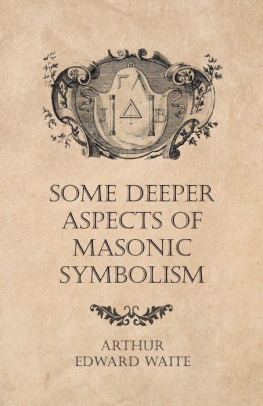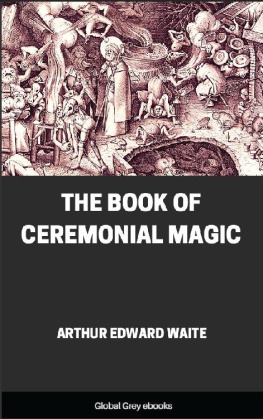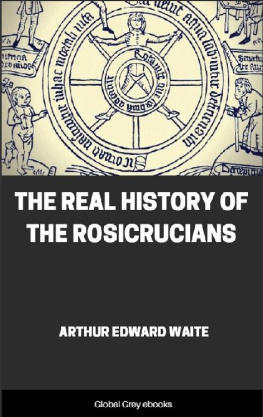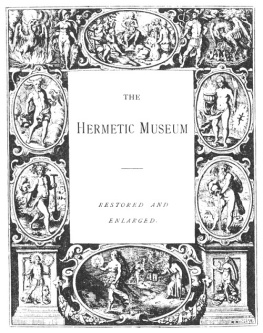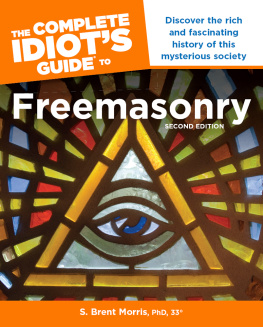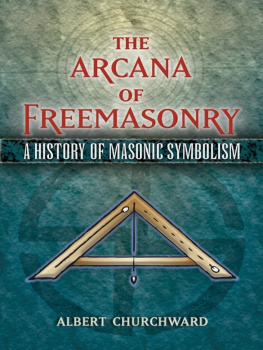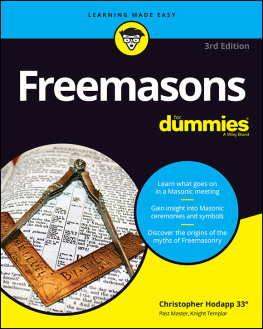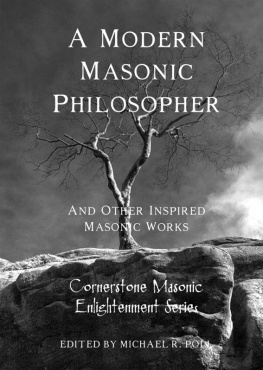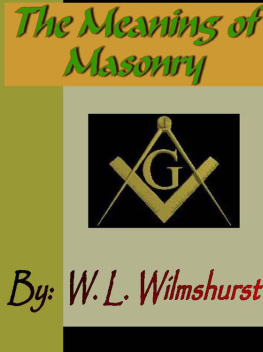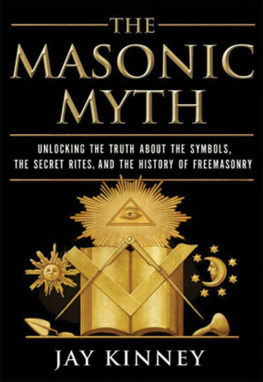| Some Deeper Aspects of Masonic Symbolism |
| Arthur Edward Waite |
| Libre Dionysia (2020) |
|
| Tags: | Esoteric, Non-Fiction, Philosophy, Spirituality |
| Esotericttt Non-Fictionttt Philosophyttt Spiritualityttt |
"Some Deeper Aspects of Masonic Symbolism" is a must read for those Freemasons interested in a better understanding of the Masonic degrees that make up the Craft Lodge of Masonry.
Waite covers such topics as, the meaning of initiation, the Third Degree, the Christian Mysteries, Operative Masonry, The Old Charges and others.
Conversion, 2020, Libre Dionysia
Libre Dionysia - Making texts available and e-reader friendly. All ePubs are manually generated and edited from sourced PDF files or physical books.
SOME DEEPER ASPECTS OF MASONIC SYMBOLISM
BY ARTHUR EDWARD WAITE
PART I
THE subject which I am about to approach is one having certain obvious difficulties, because it is outside the usual horizon of Masonic literature, and requires, therefore, to be put with considerable care, as well as with reasonable prudence. Moreover, it is not easy to do it full just-ice within the limits of a single lecture. I must ask my Brethren to make allowance beforehand for the fact that I am speaking in good faith, and where the evidence for what I shall affirm does not appear in its fullness, and sometimes scarcely at all, they must believe that I can produce it at need, should the opportunity occur. As a matter of fact, some part of it has appeared in my published writings.
I will introduce the question in hand by a citation which is familiar to us all, as it so happens that it forms a good point of departure:- "But as we are not all operative Masons, but rather Free and Accepted or speculative, we apply these tools to our morals." With certain variations, these words occur in each of the Craft Degrees, and their analogies are to be found in a few subsidiary Degrees which may be said to arise out of the Craft-as, for example, the Honorable Degree of Mark Master Mason. That which is applied more specially to the working implements of Masonry belongs to our entire building symbolism, whether it is concerned with the erection by the Candidate in his own personality of an edifice or "superstructure perfect in its parts and honorable to the builder, " or, in the Mark Degree, with a house not made with hands, eternal in the heavens, or again with Solomon's Temple spiritualized in the Legend of the Master Degree.
A SYSTEM OF MORALITY
It comes about in this manner that Masonry is described elsewhere as "a peculiar system of morality, veiled in allegory and illustrated by symbols." I want to tell you, among other things which call for consideration, something about the nature of the building, as this is presented to my mind, and about the way in which allegory, symbols and drama all hang together and make for one meaning. It is my design also to show that Craft Masonry incorporates three less or more distinct elements which have been curiously interlinked under the device of symbolical architecture. That interlinking is to some extent artificial, and yet it arises logically, so far as the relation of ideas is concerned.
There is, firstly, the Candidate's own work, wherein he is taught how he should build himself. The method of instruction is practical within its own measures, but as it is so familiar and open, it is not, properly speaking, the subject-matter of a Secret Order. There is, secondly, a building myth, and the manner in which it is put forward involves the Candidate taking part in a dramatic scene, wherein he represents the master-builder of Masonry. There is, thirdly, a Masonic quest, connected with the notion of a Secret Word communicated as an essential part of the Master-Degree in building. This is perhaps the most important and strangest of the three elements; but the quest after the Word is not finished in the Third Degree.
THE FIRST DEGREE
Let us look for a moment at the Degree of Entered Apprentice, and how things stand with the Candidate when he first comes within the precincts of the Lodge. He comes as one who is "worthy and well recommended," as if he contained within himself certain elements or materials which are adaptable to a specific purpose. He is described by his conductor as a person who is "properly prepared." The fitness implied by the recommendation has reference to something which is within him, but not of necessity obvious or visible on his surface personality. It is not that he is merely a deserving member of society at large. He is this, of course, by the fact that he is admitted; but he is very much more, because Masonry has an object in view respecting his personality, something that can be accomplished in him as a result of his fellowship in the Brotherhood, and by himself. As a matter of truth, it is by both. The "prepared" state is, however, only external, and all of us know in what precisely it consists.
Now the manner of his preparation for entrance into the Lodge typifies a state which is peculiar to his inward position as a person who has not been initiated. There are other particulars into which I need not enter, but it should be remarked that in respect of his preparation he learns only the meaning of the state of darkness, namely, that he has not yet received the light communicated in Masonry. The significance of those hindrances which place him at a disadvantage, impede his movements, and render him in fact helpless, is much deeper than this. They constitute together an image of coming out from some old condition by being unclothed therefrom- partially at least- and thereafter of entering into a condition that is new and different, in which another kind of light is communicated, and another vesture is to be assumed, and, ultimately, another life entered.
THE MEANING OF INITIATION
In the first Degree the Candidate's eyes are opened into the representation of a new world, for you must know, of course, that the Lodge itself is a symbol of the world, extending to the four corners, having the height of heaven above and the great depth beneath. The Candidate may think naturally that light has been taken away from him for the purpose of his initiation, has been thereafter restored automatically, when he has gone through a part of the ceremony, and that hence he is only returned to his previous position. Not so. In reality, the light is restored to him in another place; he has put aside old things, has come into things that are new; and he will never pass out of the Lodge as quite the same man that he entered. There is a very true sense in which the particulars of his initiation are in analogy with the process of birth into the physical world. The imputed darkness of his previous existence, amidst the life of the uninitiated world, and the yoke which is placed about him is unquestionably in correspondence with the umbilical cord. You will remember the point at which he is released there from- in our English ritual, I mean. I do not wish to press this view, because it belongs of right, in the main, to another region of symbolism, and the procedure in the later Degrees confuses an issue which might be called clear otherwise in the Degree of Entered Apprentice. It is preferable to say that a new light- being that of Masonry-illuminates the world of the Lodge in the midst of which the Candidate is placed; he is penetrated by a fresh experience; and he sees things as they have never been presented to him before. When he retires subsequently for a period, this is like his restoration to light; in the literal sense he resumes that which he set aside, as he is restored to the old light; but in the symbolism it is another environment, a new body of motive, experience, and sphere of duty attached thereto. He assumes a new vocation in the world.

